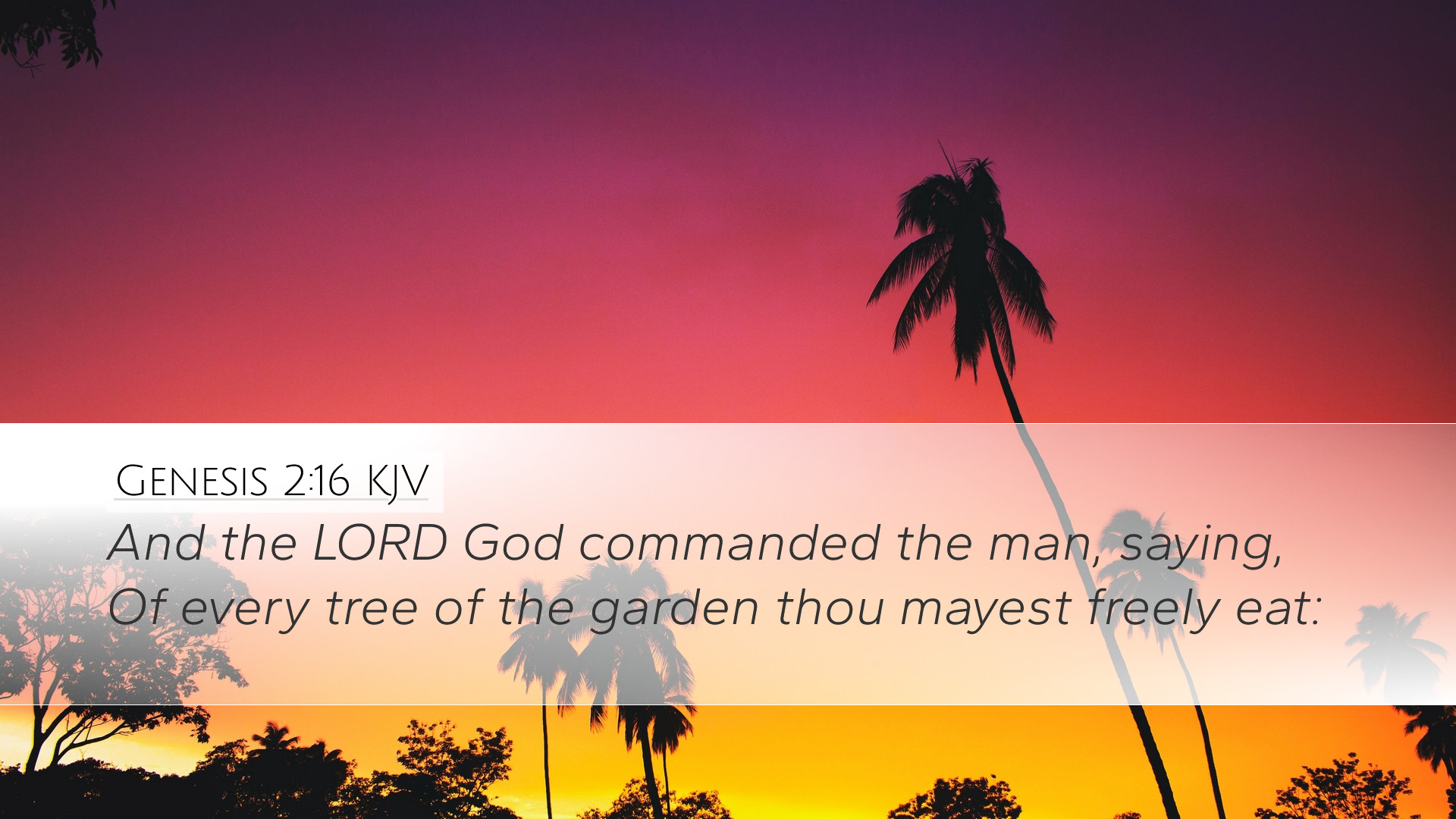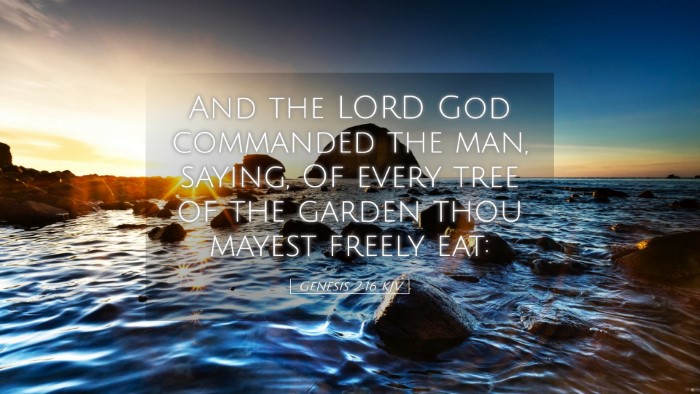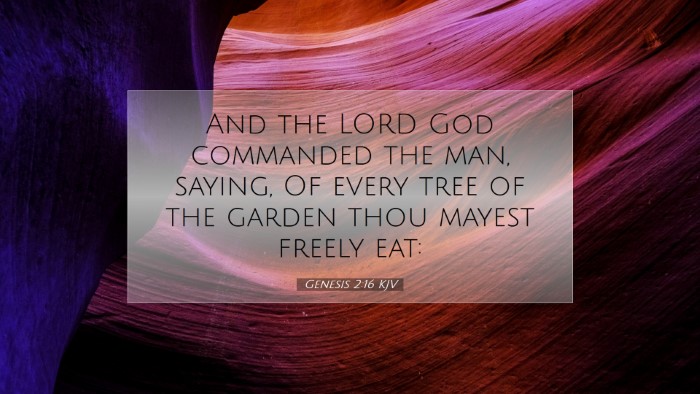Commentary on Genesis 2:16
Verse: "And the Lord God commanded the man, saying, 'Of every tree of the garden thou mayest freely eat:'" (Genesis 2:16 KJV)
Overview
This verse marks a pivotal moment in the narrative of creation, highlighting the relationship between God, humanity, and the moral order established within the created world. The command given to Adam is both an offer of abundance and a guideline for ethical living.
The Divine Command
Matthew Henry's Insights: Matthew Henry underscores the gravity of God's command. He notes that God commands the man, indicating a personal relationship and direct communication. The command serves as both a privilege and a responsibility, establishing Adam as a steward of creation.
Albert Barnes' Commentary: Barnes emphasizes the authority of God's command. The phrase "the Lord God" signifies both the Creator's majesty and His personal involvement in human affairs. God's command encompasses both freedom ("freely eat") and restriction, suggesting that while humanity is given vast resources, there are boundaries that must not be crossed.
Adam Clarke's Analysis: Clarke elaborates on the significance of God's instruction, recognizing it as a divine ordinance that frames the ethos of obedience and trust. Clarke raises the point that the command is simple yet profound, as it establishes the premise for humanity's moral testing. The stipulation of not eating from one specific tree introduces the concept of free will and ethical choice.
The Context of Abundance
The command starts with a recognition of the abundance of God’s provisions. The phrase "of every tree" reveals that the garden is replete with opportunities for nourishment and experience. This abundance is a testament to God's generosity.
- Matthew Henry: He points out that while liberty is given, it must be understood in the context of divine order. The garden is filled with resources, yet there are limits to ensure that Adam remains under God's authority.
- Albert Barnes: Barnes reiterates that the unrestricted access to the trees symbolizes God's desire for a relationship based on love and trust, rather than mere compliance.
- Adam Clarke: Clarke highlights the psychological aspect of choice. The countless trees contrast sharply with the single prohibition, emphasizing the role of human agency in the moral landscape.
The Nature of Free Will
Free will is foundational to this command. God’s directive allows for human agency in choosing to obey or disobey. Each tree represents a choice shaped by the first man’s desire and intention.
- Matthew Henry: He clarifies that true obedience must stem from the heart. Adam's decision-making ability enriches his existence in the garden and showcases the moral framework God desires.
- Albert Barnes: Barnes discusses the implications of free will, noting that it is fundamental to the integrity of moral choices. The existence of a command reflects God's intention for humankind to embrace ethical living through voluntary obedience rather than coercion.
- Adam Clarke: Clarke posits that for love to be genuine, it cannot be compelled. The command equips Adam with the power to choose, shaping the context for testing one's loyalty to God.
The Importance of Boundaries
While the command promotes freedom, it simultaneously establishes a crucial boundary. The designation of one specific tree as off-limits introduces the principle of moral accountability.
- Matthew Henry: Henry suggests that boundaries serve as a safeguard, steering humanity toward righteousness. They are not restrictive for the sake of legalism but rather protective in ensuring the health of the relationship with God.
- Albert Barnes: Barnes notes that the restriction becomes a vital aspect of Adam’s moral responsibility. The prohibition invites contemplation and reveals the essence of obedience in the context of divine law.
- Adam Clarke: Clarke articulates that the boundary of the prohibition exemplifies the delicate balance between freedom and authority. The act of abstaining from the tree conveys a profound meaning of allegiance to God’s command.
Theological Implications
The instructions embedded in Genesis 2:16 carry profound theological significance. They illustrate God’s character, the nature of humanity, and the framework for morality.
- Matthew Henry: He identifies this command as an essential part of the covenant relationship, anticipating the eventual fall and the consequences of disobedience.
- Albert Barnes: Barnes highlights that this command offers insights into the nature of sin and temptation, setting the stage for the biblical narrative that unfolds in later chapters.
- Adam Clarke: Clarke suggests that understanding God's command provides key insights into the essence of human purpose within creation. Obedience signifies the fulfillment of one’s role as God's caretaker.
Conclusion
Genesis 2:16 encapsulates a moment of divine revelation that resonates through the entirety of Scripture. This command invites reflection on the themes of abundance, free will, moral boundaries, and the inherent relationship between God and humanity. For pastors, scholars, and students of theology, this verse acts as a reminder of the complex interplay between God's gracious provisions and the ethical choices inherent in our existence.


